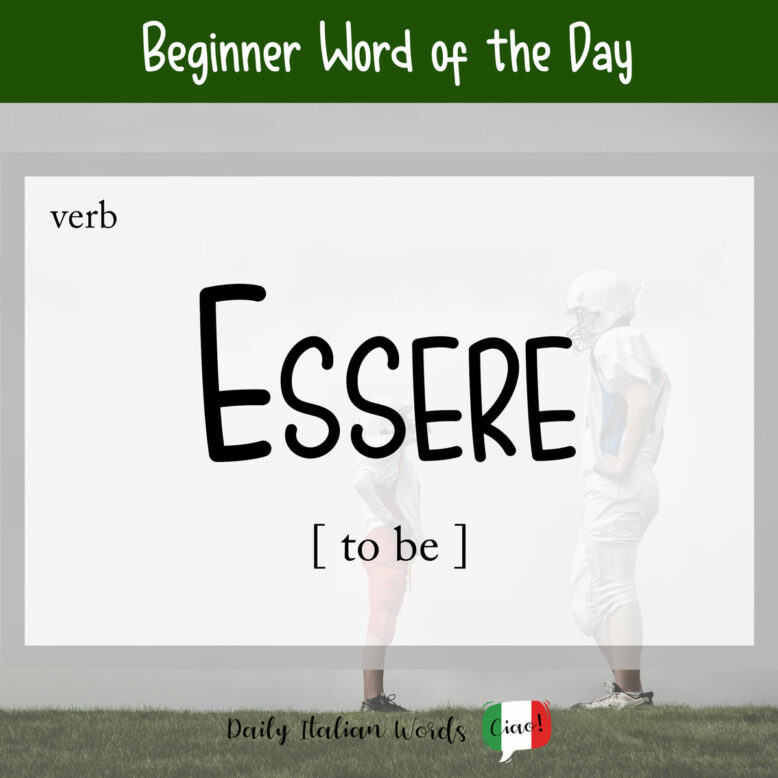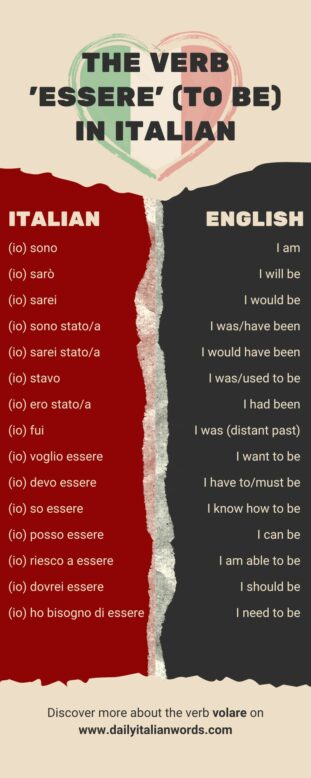One of the first verbs all serious learners must master in Italian is essere which is the infinitive verb for to be or to exist.

Because it is an irregular verb, it isn’t as easy to conjugate as regular -are, -ire and -ere verbs such as mangiare (to eat), venire (to come), and vedere (to see). That being said, it is used all the time so most learners pick it up very quickly!
In the present tense (presente), the conjugations are as follows:
- (Io) sono = I am
- (Tu) sei = You are
- (Lui) è = He is
- (Lei) è = She is / You (formal) are
- (Noi) siamo = We are
- (Voi) siete = You (guys) are
- (Loro) sono = They are
Note: in Italian grammar, the formal third person forms are egli/esso (singular masculine), ella/essa (singular feminine), essi (plural masculine) and esse (plural feminine). However in colloquial Italian, you’ll hear lui, lei and loro much more often.
In Italian, you can choose not to mention the subject (io, tu, etc.) because the conjugated verb on its own is enough to tell you who the subject is. Even in cases where the conjugated verbs are identical, such as io sono and loro sono for example, you can usually figure out the subject by looking at the gender and/or number of the adjective that follows:
- (Io) sono felice. = I am happy.
- (Loro) sono felici. = They are happy.
- (Lui) è arrabbiato. = He is angry.
- (Lei) è arrabbiata. = She is angry.
Essere can of course be conjugated in many different ways depending on the grammatical tense you wish to use. Let’s take a look at the various conjugations now.
Imperfetto (imperfect):
- (Io) ero = I was
- (Tu) eri = You were
- (Lui) era = He was
- (Lei) era = She was / You (formal) were
- (Noi) eravamo = We were
- (Voi) eravate = You (guys) were
- (Loro) erano = They were
Passato remoto (remote past):
*This tense is typically used in literature, when talking about historical events, or when a speaker is referring to his or her own distant past. It is rarely used in speech in the north of Italy.
- (Io) fui = I was
- (Tu) fosti = You were
- (Lui) fu = He was
- (Lei) fu = She was / You (formal) were
- (Noi) fummo = We were
- (Voi) foste = You (guys) were
- (Loro) furono = They were
Futuro semplice (simple future):
- (Io) sarò = I will be
- (Tu) sarai = You will be
- (Lui) sarà = He will be
- (Lei) sarà = She will be / You (formal) will be
- (Noi) saremo = We will be
- (Voi) sarete = You (guys) will be
- (Loro) saranno = They will be
Condizionale presente (present conditional):
- (Io) sarei = I would be
- (Tu) saresti = You would be
- (Lui) sarebbe = He would be
- (Lei) sarebbe = She would / You (formal) would be
- (Noi) saremmo = We would be
- (Voi) sareste = You (guys) would be
- (Loro) sarebbero = They would be
Imperativo (imperative):
- (Tu) sii = (You) be
- (Lei) sia* = (You) (formal) be
- (Noi) siamo = (We) be
- (Voi) siate = (You) (guys) be
- (Loro) siano* = (They) be
*Note: the third person (formal singular and plural) is used in what is called the indirect imperative for formal situations or towards people we wish to show respect.
Congiuntivo presente (present subjective):
- (Io) sia = I am
- (Tu) sia = you are
- (Lui) sia = he is
- (Lei) sia = she is / You (formal) are
- (Noi) siamo = we are
- (Voi) siate = you (guys) are
- (Loro) siano = they are
Congiuntivo imperfetto (imperfect subjunctive):
- (Io) fossi = I were
- (Tu) fossi = you were
- (Lui) fosse = he were
- (Lei) fosse = she were / you (formal) were
- (Noi) fossimo = we were
- (Voi) foste = you (guys) were
- (Loro) fossero = they were
In Italian, there are also many compound tenses, made up of an auxiliary verb – either essere (to be) or avere (to have) – plus a past participle.
Passato prossimo (present perfect):
- (Io) sono stato/a = I have been OR I was
- (Tu) sei stato/a = You have been OR I was
- (Lui) è stato = He has been OR I was
- (Lei) è stata = She has been / You (formal) have been OR She was / You (formal) were
- (Noi) siamo stati/e = We have been OR We were
- (Voi) siete stati/e = You (guys) have been OR You (guys) were
- (Loro) sono stati/e = They have been OR They were
Trapassato prossimo (past perfect):
- (Io) ero stato/a = I had been
- (Tu) eri stato/a = You had been
- (Lui) era stato = He had been
- (Lei) era stata = She had been / You (formal) had been
- (Noi) eravamo stati/e = We had been
- (Voi) eravate stati/e = You (guys) had been
- (Loro) erano stati/e = They had been
Trapassato remoto (preterite perfect):
- (Io) fui stato/a = I had been
- (Tu) fosti stato/a = You had been
- (Lui) fu stato = He had been
- (Lei) fu stata = She had been / You (formal) had been
- (Noi) fummo stati/e = We had been
- (Voi) foste stati/e = You (guys) had been
- (Loro) furono stati/e = They had been
Futuro anteriore (future perfect):
- (Io) sarò stato/a = I will have been
- (Tu) sarai stato/a = You will have been
- (Lui) sarà stato = He will have been
- (Lei) sarà stata = She will have been / You (formal) will have been
- (Noi) saremo stati/e = We will have been
- (Voi) sarete stati/e = You (guys) will have been
- (Loro) saranno stati/e = They will have been
Condizionale passato (past conditional):
- (Io) sarei stato/a = I would have
- (Tu) saresti stato/a = You would have
- (Lui) sarebbe stato/a = He would have
- (Lei) sarebbe stato/a = She would have / You (formal) would have
- (Noi) saremmo stati/e = We would have
- (Voi) sareste stati/e = You (guys) would have
- (Loro) sarebbero stati/e = They would have
Congiuntivo passato (present perfect subjunctive):
- (Io) sia stato/a = I have been
- (Tu) sia stato/a = you have been
- (Lui) sia stato/a = he has been
- (Lei) sia stato/a = she has been / You (formal) have been
- (Noi) siamo stati/e = we have been
- (Voi) siate stati/e = you (guys) have been
- (Loro) siano stati/e = they have been
Congiuntivo trapassato (past perfect subjunctive):
- (Io) fossi stato/a = (I) had been
- (Tu) fossi stato/a = (You) had been
- (Lui) fosse stato/a = (He) had been
- (Lei) fosse stato/a = She had been / You (formal) had been
- (Noi) fossimo stati/e = We had been
- (Voi) foste stati/e = You (guys) had been
- (Loro) fossero stati/e = They had been

Example phrases using essere:
(Tu) sei ancora qui? – Sì, (io) sono troppo stanco per guidare a casa. Sono le 3 del mattino.
You’re still here? – Yes, I’m too tired to drive back home. It’s 3 in the morning.
Se (io) fossi stato onesto, (tu) saresti stata molto più felice.
If I had been honest, you would have been much happier.
(Io) credo che (lui) sia stato licenziato ma non sono sicuro al 100%.
I believe he has been fired but I’m not 100% sure.
Sii puntuale domani, mi raccomando*!
Please make sure to be on time tomorrow!
*Mi raccomando is a popular Italian expression. Find out more about it in our dedicated article.
Heather Broster is a graduate with honours in linguistics from the University of Western Ontario. She is an aspiring polyglot, proficient in English and Italian, as well as Japanese, Welsh, and French to varying degrees of fluency. Originally from Toronto, Heather has resided in various countries, notably Italy for a period of six years. Her primary focus lies in the fields of language acquisition, education, and bilingual instruction.


